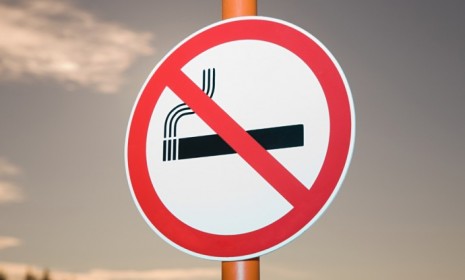The world's first smoke-free country?
The small nation of Bhutan plans to prosecute citizens who light up. Do its ultrastrict regulations go too far?

A free daily email with the biggest news stories of the day – and the best features from TheWeek.com
You are now subscribed
Your newsletter sign-up was successful
The tiny South Asian country of Bhutan has taken anti-smoking regulations to a new level, reports Reuters. Bhutan banned the sale of tobacco in 2005, but cigarettes remained widely available on the black market. So, at the start of 2011, the country began enforcing the Tobacco Control Act, passed overwhelmingly in June, which allows agents of the Bhutan Narcotic Control Agency to raid the homes and businesses of those suspected of possessing or selling smuggled tobacco. Police are even training dogs to sniff out contraband in homes and stores. A brief guide to Bhutan's tobacco crackdown:
So is smoking completely illegal in Bhutan?
Not quite yet. Citizens who still want to smoke privately are allowed to import 200 cigarette "sticks" a month from neighboring countries such as India, although they must have customs paperwork to prove they acquired the cigarettes legally. Anyone caught smoking who can't produce the proper receipts faces up to three years in prison. For selling bootleg tobacco, the penalty is five years. And Bhutan's government has publicly proclaimed that it wants to make the country completely tobacco-free—Reuters notes that, culturally, "smoking is considered bad for one's karma" in the Buddhist nation.
The Week
Escape your echo chamber. Get the facts behind the news, plus analysis from multiple perspectives.

Sign up for The Week's Free Newsletters
From our morning news briefing to a weekly Good News Newsletter, get the best of The Week delivered directly to your inbox.
From our morning news briefing to a weekly Good News Newsletter, get the best of The Week delivered directly to your inbox.
How has the public reacted?
Many Butanese are upset with the harshness of the new restrictions. Online forums are full of grumbling about the logic and logistics of the law, and the country's biggest newspaper, Kuensel, recently weighed in with a strongly worded editorial, saying that the penalties in the Tobacco Control Act are, "in every sense of the word, draconian." Prime Minister Jigmi Y. Thinley defended the rules. Tobacco is "cancerous to society and to the individual," Thinley said, "and in many ways it is no different from psychotropic drugs, for which the penalty in certain countries is death."
Could this realistically work?
Illegal cigarette sales at small shops have dropped precipitously since the law went into effect, and the smoking rate in Bhutan is thought to be about 12 percent, compared to 23 percent in the United States. But the website Yes But However says that, historically, black markets pop up when government restrictions go into effect. And given its "porous borders," Bhutan's "new democracy will have its hands full in clamping down on the smoking habit." Besides, "with only one sniffer dog currently available in the cash-poor country, smokers can still rest relatively easy."
A free daily email with the biggest news stories of the day – and the best features from TheWeek.com
Sources: Reuters, Global Voices, Yes But However